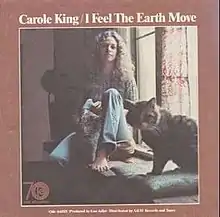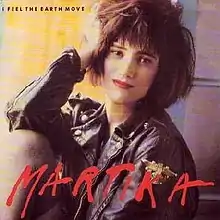| "I Feel the Earth Move" | ||||
|---|---|---|---|---|
 US vinyl single; picture is also used for the "It's Too Late" side and the parent album Tapestry | ||||
| Single by Carole King | ||||
| from the album Tapestry | ||||
| A-side | "It's Too Late" | |||
| Released | April 16, 1971 | |||
| Genre | Pop rock | |||
| Length | 3:00 | |||
| Label | Ode | |||
| Songwriter(s) | Carole King | |||
| Producer(s) | Lou Adler | |||
| Carole King singles chronology | ||||
| ||||
"I Feel the Earth Move" is a song written and recorded by American singer-songwriter Carole King, for her second studio album Tapestry. Additionally, the song is one half of the double A-sided single, the flip side of which was "It's Too Late". Together, both "I Feel the Earth Move" and "It's Too Late" became among the biggest mainstream pop hits of 1971.
Jon Landau's review of the Tapestry for Rolling Stone praised King's voice on this track, saying it negotiates turns from "raunchy" to "bluesy" to "harsh" to "soothing", with the last echoing the development of the song's melody into its chorus.[1] Landau describes the melody of the refrain as "a pretty pop line".[1] Forty years later, Rolling Stone stated that King's "warm, earnest singing" brought "earthy joy" to the song.[2] Music journalist Harvey Kubernik wrote that "I Feel the Earth Move" was "probably the most sexually aggressive song on the Tapestry album" and a "brave" opening to an album whose mood is mostly "mellow confessionality".[3] AllMusic critic Stewart Mason describes the song as "the ultimate in hippie-chick eroticism" and writes that it "sounds like the unleashing of an entire generation of soft-spoken college girls' collective libidos".[4] Cash Box described the song as being a "forceful 'earthquake song'" and considered its pairing with "It's Too Late" as a single to be "double dynamite."[5] Record World said that it is "quality contemporary pop."[6]
Author James Perone praised the way the lyrics and music work together.[7] As a prime example, he notes the syncopated rhythm to the melody on which King sings "tumbling down".[7] This rhythm, putting the accent at the end of the word "tumbling" rather than at the beginning, produces a "musical equivalent of a tumble."[7] Perone also notes that the fast tempo allows the listener to feel the singer's excitement over being near her lover, and that the lyrics also express sexual tension even though that tension is left implicit.[7] Perone attributes some of the song's success to producer Lou Adler's decision to highlight King's piano playing in the mix, giving it a different feel from the guitar-based singer-songwriter approach King took in her prior album.[7] Mason also attributes the song's success to the "piano-led groove" and to King's vocal delivery.[4]
King's version of "I Feel the Earth Move" peaked at number 1 on the Billboard Hot 100 chart dated June 19, 1971. It remained there for five consecutive weeks.[8] It also peaked at number 6 in the United Kingdom.
Given its upbeat nature, Ode Records selected "I Feel the Earth Move" as the A-side to Tapestry's first single. It achieved airplay, but then disc jockeys and listeners began to prefer the slower, lamenting B-side "It's Too Late". Both sides received airplay for a while, but eventually "It's Too Late" dominated. In fact, on the concurrent Cash Box singles chart, which still tracked the progress of both sides of a single separately, "It's Too Late" spent four weeks at number 1 while "I Feel the Earth Move" did not chart at all. Regardless, since Billboard had declared the record a double A-side and their chart gradually became seen by many as the "official" singles chart, it is generally listed in books and articles that both "I Feel the Earth Move" and "It's Too Late" reached number 1.
Together with "It's Too Late", "I Feel the Earth Move" was named by the RIAA as number 213 of 365 Songs of the Century.
Personnel
- Carole King – keyboards, vocals
- Danny Kootch – electric guitar
- Charles Larkey – electric bass
- Joel O'Brien – drums
Charts
All entries charted with "It's Too Late".
Weekly charts
|
Year-end charts
|
Martika version
| "I Feel the Earth Move" | ||||
|---|---|---|---|---|
 | ||||
| Single by Martika | ||||
| from the album Martika | ||||
| B-side | "Quiero Entregarte Mi Amor" | |||
| Released | August 1989 | |||
| Genre | Dance-pop[13] | |||
| Length | 4:12 | |||
| Label | Columbia | |||
| Songwriter(s) | Carole King | |||
| Producer(s) | ||||
| Martika singles chronology | ||||
| ||||
Released in mid-1989, "I Feel the Earth Move" is the third single from American singer-songwriter and actress Martika's self-titled debut album, Martika (1988). It reached number seven in the United Kingdom and number two in Australia. The single also reached number 25 on the US Billboard Hot 100 but quickly fell down the chart after radio stations pulled it from their playlists in the wake of the 1989 San Francisco earthquake. The music video was shot during the promotional tour for this album.
Track listing
- Cassette and 7-inch single
- Side A – "I Feel the Earth Move"
- Side B – "Quiero Entregarte Mi Amor" (Spanish version of "More Than You Know")
Charts
Weekly charts
|
Year-end charts
|
Certifications
| Region | Certification | Certified units/sales |
|---|---|---|
| Australia (ARIA)[31] | Platinum | 70,000^ |
|
^ Shipments figures based on certification alone. | ||
Other notable covers
In June 1989, British boy band Big Fun released their cover of the song as a single, which was included on their 1990 album A Pocketful of Dreams produced by the Stock Aitken Waterman team, on which it appears as a bonus track on the CD and cassette formats. Brix Smith of Record Mirror panned this version he called a "massacre", adding that the fact of "discofy[ing]" the track shows "a lack of imagination, avarice, and insensivity to music".[32]
References
- 1 2 Landau, Jon (April 29, 1971). "Carole King: Tapestry". Rolling Stone. Archived from the original on April 18, 2008.
- ↑ "500 Greatest Albums of All Time: Tapestry". Rolling Stone. May 31, 2009. Archived from the original on April 27, 2013. Retrieved April 13, 2014.
- ↑ Kubernik, H. "Troubadours: Carole King / James Taylor & The Rise of the Singer-Songwriter: Carole King's Monumental Tapestry Album". PBS. Retrieved April 6, 2014.
- 1 2 Mason, S. "I Feel the Earth Move". AllMusic. Retrieved April 17, 2014.
- ↑ "CashBox Record Reviews" (PDF). Cash Box. May 1, 1971. p. 24. Retrieved December 10, 2021.
- ↑ "Picks of the Week" (PDF). Record World. May 1, 1971. p. 1. Retrieved April 22, 2023.
- 1 2 3 4 5 Perone, J.D. (2006). The Words and Music of Carole King. Greenwood Publishing. pp. 33–34. ISBN 9780275990275.
- ↑ "The Hot 100: June 19, 1971". Billboard. Retrieved February 23, 2013.
- ↑ Kent, David (1993). Australian Chart Book 1970–1992. St Ives, NSW: Australian Chart Book. ISBN 0-646-11917-6.
- ↑ "Official Singles Chart Top 100". Official Charts Company. Retrieved September 17, 2020.
- ↑ "Carole King Chart History (Hot 100)". Billboard. Retrieved September 17, 2020.
- ↑ "Billboard Top 100 – 1971". Billboardtop100of.com. Retrieved September 17, 2020.
- ↑ Breihan, Tom (August 2, 2021). "The Number Ones: Martika's "Toy Soldiers"". Stereogum. Retrieved October 11, 2022.
Her next single, an OK dance-pop cover of Carole King's 'I Feel The Earth Move'...
- ↑ "Martika – I Feel the Earth Move". ARIA Top 50 Singles. Retrieved September 17, 2020.
- ↑ "Martika – I Feel the Earth Move" (in German). Ö3 Austria Top 40. Retrieved September 17, 2020.
- ↑ "Martika – I Feel the Earth Move" (in Dutch). Ultratop 50. Retrieved September 17, 2020.
- ↑ "Top RPM Singles: Issue 6592." RPM. Library and Archives Canada. Retrieved September 17, 2020.
- ↑ "Top RPM Dance/Urban: Issue 6613." RPM. Library and Archives Canada. Retrieved September 17, 2020.
- ↑ "Eurochart Hot 100 Singles" (PDF). Music & Media. Vol. 6, no. 48. December 2, 1989. p. V. Retrieved September 17, 2020.
- ↑ Nyman, Jake (2005). Suomi soi 4: Suuri suomalainen listakirja (in Finnish) (1st ed.). Helsinki: Tammi. ISBN 951-31-2503-3.
- ↑ "The Irish Charts – Search Results – I Feel the Earth Move". Irish Singles Chart. Retrieved September 17, 2020.
- ↑ "Martika – I Feel the Earth Move". Top 40 Singles. Retrieved September 17, 2020.
- ↑ "Martika – I Feel the Earth Move". Swiss Singles Chart. Retrieved September 17, 2020.
- ↑ "Official Singles Chart Top 100". Official Charts Company. Retrieved September 17, 2020.
- ↑ "Martika Chart History (Hot 100)". Billboard. Retrieved September 17, 2020.
- ↑ "Martika Chart History (Dance Club Songs)". Billboard. Retrieved September 17, 2020.
- ↑ "U.S. Cash Box Charts" (PDF). popmusichistory. Retrieved March 9, 2023.
- ↑ "Offiziellecharts.de – Martika – I Feel the Earth Move" (in German). GfK Entertainment charts. Retrieved September 17, 2020.
- ↑ Ryan, Gavin (2011). Australia's Music Charts 1988–2010. Mt. Martha, VIC, Australia: Moonlight Publishing.
- ↑ "Year End Singles". Record Mirror. January 27, 1990. p. 44.
- 1 2 "The ARIA Australian Top 100 Singles Chart 1990 (61–100) (from The ARIA Report No. 50)". ARIA. Retrieved November 14, 2020 – via Imgur.
- ↑ Smith, Brix (June 17, 1989). "45 reviewed by Brix Smith" (PDF). Record Mirror. London: Spotlight Publications Ltd. p. 29. ISSN 0144-5804. Retrieved October 24, 2021 – via World Radio History.